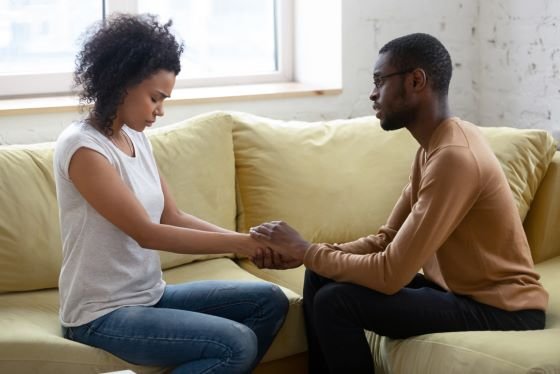
Emotional support after miscarriage
A miscarriage can have serious emotional impact on the affected woman, her partner, friends and family.
In some cases, the emotional impact is felt immediately after the miscarriage. It is totally normal for a woman and affected people to be in guilt, sadness, anger, shock, denial and disbelief. In other cases, it can take several weeks for the emotional impact to kick in.
You may find yourself having unclear or negative feelings towards those who have had successful pregnancies. Many people affected by a miscarriage go through a mourning period. It is important to mention that people grieve differently.
Do not force anyone to do certain things so as to heal. While some people find it comforting to talk about their feelings, others prefer to deal with it silently. To them this issue is too painful to discuss.
Some women come to terms with their grief soon after the miscarriage and start planning for their next pregnancy. For other women, the thought of another pregnancy is too draining and traumatic. With time, however, they may become open to another pregnancy when emotionally and physically ready. There is no timeline for this. It can take months, years or never.
The situation can be worse for women who have a history of depression and anxiety. They may require professional help to deal with the complicated emotions and grief that result from a miscarriage. Friends and relative need to stay close to women who suffer from depression and anxiety.
Friends and relatives can also help by being sensitive when talking about other people’s successful pregnancies and assist in taking care of other children in the family.
The father of the lost baby or partner to the woman may also be greatly affected. The problem is that men sometimes find it hard to express their feelings, especially if they have been socialized to believe that men should not be emotional. Sometimes men may feel that they should offer support to the mother and not the other way around. It is very okay and healthy for men openly discuss their feelings with their partners or other people he trusts.
If you have experienced a miscarriage or affected by one, here are some things that can help you cope.
10 things you can do:
- Do not blame yourself. When a miscarriage happens, the first questions that goes through a woman’s mind is ‘what did I do wrong? Or What could I have done differently? Know that it is not your fault. Most miscarriage happen due to factors above your control.
- Talk about your feelings to your partner, friend, family member, health professional or counsellor. Talking things through helps you to release tension, rather than keeping it inside. It helps strengthen your relationships and connect with people.
- Take good care of yourself as this will help you recover. Drink lots of water, eat a balanced diet, gets lots of sleep, and do some light physical exercises.
- Consider taking advantage of counselling offered in various health facilities after a miscarriage. A doctor or counsellor will be assigned to you and they will counsel you and help you process the loss. You can also reach out to a mental health provider e.g. a therapist or counselor.
- Consider peer support, where people use their experiences to help each other. Do not suffer in silence – most people feel grief after a loss and support is available. If you know someone who has gone through this loss, consider talking to them, they are likely to be more understanding since they have gone through similar loss.
- Try to do the things you love such as taking walks, going to the gym, having tea with friends, cooking, swimming just to mention a few. Doing things that you enjoy is good for your emotional wellbeing. Things that can lighten your mood.
- Try not to use alcohol, cigarettes, gambling or drugs to relieve grief – these can all contribute to poor mental health. You may also get addicted since they seem to provide temporary comfort.
- Friends and relatives need to be careful not to say hurtful things. It is often hard to find words to console with the woman, but rather than say hurtful things, you’d rather just stay silent. Give them a hug and offer your assistance whenever possible.
- Do not try to do everything at once – set small targets that you can easily achieve. Take one day at a time and do not be hard on yourself in case you don’t heal at a faster pace. Take time and space to heal.
- Remember that you can conceive again. This is not a consolation since one pregnancy cannot replace another yet is encouraging to know that you can go on to have a healthy pregnancy. Also, note that getting pregnant again may not be the solution to get over the feelings of grief after a miscarriage. It is advisable to heal first before considering another pregnancy.
Getting professional support
If you’re worried that you or your partner are having problems coping with grief, you may need further treatment and counselling. There are support groups that can provide or arrange counselling for people who have been affected by miscarriage.
You can call Marie Stopes Kenya today for free on 0800 720005 or WhatsApp them on 0709819001 for support and help you if you’ve experienced a miscarriage or need support with pregnancy crisis counselling and management.

I have learnt that one has…
I have learnt that one has to keep oneself busy doing something which makes one happy and avoid being lonely when one has experienced miscourage
Hello Sir, thank you for…
Hello Sir, thank you for reaching out to us we appreciate your input,. Yes indeed! Getting through such a period may be difficult and people may use different coping mechanisms to help them through.